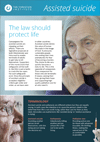The founder of the controversial Swiss suicide clinic Dignitas has been accused of breaking the law by profiting from patients’ fees, according to press reports.
Ludwig Minelli is being investigated by Swiss prosecutors over claims that his clinic is contravening the rules that allow it to assist patients in committing suicide and to operate as a charity.
There are also allegations that the personal possessions of patients have gone missing after their deaths.
It is thought that the investigations have been prompted by negative media coverage of the clinic and stories from former staff.
One nurse and former employee, Soraya Wernli, said she left the clinic because she was worried people were being rushed into making a decision about ending their lives.
She said: “I joined because I believed it was a good organisation which helped the terminally ill end their suffering but I came to realise it was really something different. It was all done for money.”
Speaking to The Sunday Telegraph, Zurich public prosecutor Urs Hubman, said: “Claims that personal possessions have gone missing from patients who have died at the clinic are being investigated by police.
“We are also examining whether assisted suicides have been carried out at Dignitas for selfish reasons, such as financial gain.
“We have to establish the facts of the claims, if any, before proceeding further.”
There are also fears that those patients suffering from depression are inadequately counselled, although Mr Minelli insists that he only accepts those who have passed weeks of counselling to determine whether they intend to take their own lives.
These allegations reflect the concerns of UK anti-euthanasia campaigners that legalised assisted suicide here would lead to individuals being pressured by others into ending their own lives.
A number of Britons have travelled to the Swiss clinic to commit suicide. But despite the UK’s ban on assisted suicide, no one has been prosecuted for helping them to get to the clinic.
The Director of Public Prosecutions recently said he was happy with the current working of the law, under which the parents of paralysed rugby player Daniel James escaped prosecution when they helped him travel to Dignitas to commit suicide.
This has been taken as effectively giving a “green light” to those planning to take relatives to commit suicide at the Swiss clinic in future.
What happens at Dignitas?
Dignitas is a Swiss charity that provides individuals with the means to kill themselves. This is usually done by leaving the patient alone in a room with a lethal dose of pentobarbital sodium, a barbiturate.
Dignitas is currently operating on the second floor of a business unit, close to a garage, a workshop and a martial arts centre.
However, it has changed locations several times. According to a recent report in The Times, this is because local residents quickly become uneasy about its activities.
The Times reports: “After someone has killed himself, the police are informed. The coroner and a doctor arrive, watch the video that has been shot shortly before in which the would-be suicide makes clear he is acting of his own free will. Testimony is taken. An ‘unnatural death’ is entered on the forms.
“While this is going on, an ambulance, usually paid for by the family of the recently deceased, is standing outside, blue lights flashing, ready to carry the body to the Institute of Forensic Medicine in Zurich in case a postmortem examination is ordered – and then to join the queue for cremation.”
The report continues: “The commotion makes the neighbours nervous and after several body-bags, complaints are lodged. Opinion polls regularly show 60 per cent or more Swiss citizens approving of assisted suicide for those with terminal diseases or with severe disabilities, but approval melts quickly if it is carried out on their doorstep.
“‘There are times when this charity resembles a guerrilla movement,” said a reporter who has followed Dignitas since it started in 1998. “It’s restless, constantly on the move.”‘

